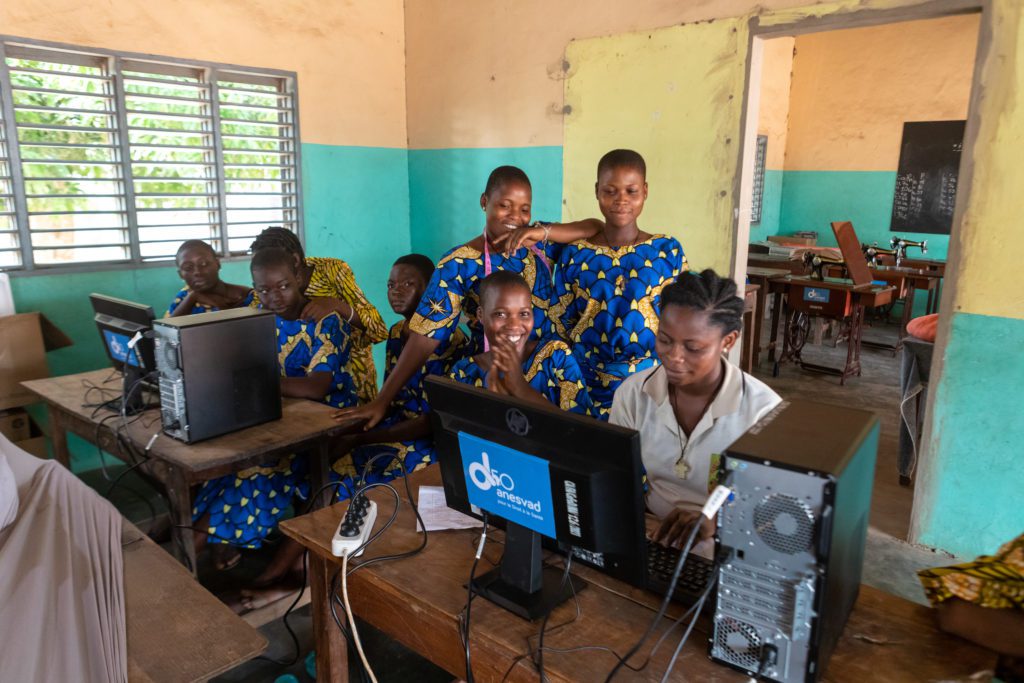Women in Africa are an indispensable part of the continent’s sustainable development, but they still face a lack of equality in the legal, economic, political and social spheres.
Women in Africa are major contributors to the continent’s economy. They are more economically active as farmers and entrepreneurs than women in any other region of the world, and women grow most of Africa’s food and own a third of all businesses.
The continent has also made many recent advances in women’s empowerment, including changes in laws to promote equal rights. Many African countries have closed the gender gap in primary education. Women hold about a third of the seats in parliaments in 11 African countries, more than in Europe.
Still, many levels of discrimination and inequality persist on the continent that hinder the full development of women in African societies. This discrimination comes in the form of laws, social norms and practices that further widen the inequality gap with men.
Although it varies drastically across African countries, the region is home to high levels of discrimination in many different terms.
Key facts about the reality faced by African women
Across Africa, women continue to face deep-rooted inequalities that shape every part of their lives. Many live in poverty, often working in informal jobs with little or no pay, while also carrying the burden of unpaid domestic work. Early marriage and gender-based violence remain persistent threats, cutting short opportunities for education and independence. Women are frequently denied access to land and inheritance, leaving them economically vulnerable. In economic life, women are often locked into informal, low-paid jobs without contracts, protections or access to credit.
Besides that, they face a wide range of injustices that affect their bodies, their futures and their basic dignity. One of the most widespread issues is gender-based violence, including domestic abuse, sexual violence and practices like female genital mutilation (FGM), which is still carried out in parts of Africa despite legal bans. Child marriage remains common in many countries, cutting short girls’ education and exposing them to early pregnancies and health risks. Access to education is also deeply unequal. Politically, women are underrepresented at all levels, from local councils to national governments.
Limited access to legal rights, education, healthcare and economic resources
For millions of African women, access to basic rights and services is still out of reach. Without legal documents like birth certificates or ID cards, many are excluded from claiming their rights. Girls often leave school early to marry or help at home, cutting off their path to education and economic independence. In healthcare, maternal services are frequently under-resourced, especially in rural areas, putting women’s lives at risk. Women farmers, who form the backbone of African agriculture, often lack access to land, credit, and markets. Bridging these gaps is not only a matter of fairness but is essential for Africa’s economic and social progress.
African women as a driver of the informal economy
In terms of employment and the economy, women in sub-Saharan Africa subsist largely in the informal economy, with little or no access to land ownership. When it comes to land used for cultivation, the impossibility of owning land has important consequences for their empowerment.
Ownership of farmland and associated decision-making power are central to women’s economic empowerment, since land is not only essential for food security and for generating an income but can also serve as collateral for credit and as a way to save for the future. Cultivating and having power over land is also essential for the sustainable development of the most impoverished communities in sub-Saharan Africa.
Not surprisingly, farmland is also a social asset: land ownership has historically conferred political power, particularly in African agrarian societies. In this sense, the limited ownership of farmland by women in Africa shapes their lack of agency, political influence and decision-making power.
Equality vs. gender roles and cultural practices
Figures that illustrate the economic and social inequality of women in relation to men can be found in the Social Institutions and Gender Index 2021 Regional Report for Africa:
- Percentage of the population who agree that men should have more rights to a job than women when jobs are scarce: 42%.
- Percentage of the population who agree that it is better for a family if the woman is primarily responsible for the care of the household and children, rather than the man: 55%.
- Percentage of women who own farmland: 12%. In West Africa, the percentage drops to 9%.
In some African countries, according to the law, the husband is considered the head of the household and the manager, administrator and owner of all assets and property, including agricultural plots and land. Not only that, but discriminatory social norms and prejudices related to women’s access to markets, finance, training and networks also inhibit women’s entrepreneurship in Africa. Strong social biases that men are better business managers than women—and the internalisation of these biases by women in these societies— also limit women’s entrepreneurship, an intention Fundación Anesvad firmly believes in and fully support through our programmes.
What in 2020
In 2020, there were 20% fewer women in the workforce than men across all African countries. Discriminatory social norms that confine women to reproductive and care roles are among the main causes of this gap. In 2018, women spent, on average, four times more time than men on unpaid care and domestic work, including raising children, caring for sick or elderly family members and managing household chores.
In addition, biased perceptions of women’s capabilities and discriminatory educational practices tend to prevent women from accessing decent jobs and confine them to specific sectors of the economy. Focusing in on the countries where we work in West Africa, we find that women are mostly concentrated in service sector jobs (catering, hospitality, retail and other services), while men dominate the industrial, logistics and resource exploitation sectors. In other words, the jobs that generate the most money and power are dominated by men, and the precarious and low-paid jobs are mostly held by women. This is the situation in countries like Togo and Benin.
Benin: self-employed women and job insecurity
The Benin-specific data are similar (and even more alarming) than the data for the West African sub-region. In Benin, according to the African Development Bank’s Africa Gender Data Book 2019:
- 95% of women are self-employed, that is, they work informally for themselves, without a formal or regular source of income.
- Only 0.7% of Beninese women create jobs for third parties.
- Less than 1 in 10 (8.4%) have access to credit or financing from banks or financial institutions.
- 94.4% of working Beninese women are estimated to have job instability and are vulnerable to income poverty.
Given these inequalities, women suffering from diseases such as NTDs are even more vulnerable to poverty and a lack of opportunities. At the Anesvad Foundation, we promote projects that address women’s’ empowerment and economic independence. If they are self-sufficient, we believe they will contribute to the sustainable development of their communities as well as improve access to health.
Promoting equality against gender roles and cultural Practices
Having said all that, promoting equality stands as a priority. That means challenging harmful traditional norms and stereotypes. Many African cultures assign women roles as caregivers and men as providers, limiting women’s autonomy; promoting equality needs to be applied in order to correct that. Education campaigns help raise awareness about women’s rights and capabilities, whilst engaging men and boys is crucial to transforming gender relations. Community leaders play a key role in changing attitudes. Legal reforms must align with cultural change to be effective. Supporting women’s voices ensures sustainable progress.
CEDAW (Convention on the Elimination of all forms of Discrimination Against Women)
CEDAW is a landmark UN treaty, adopted in 1979, that defines what equality means for women around the world. It commits countries to eliminate discrimination against women in all areas of life, from education and work to health and political participation. Many African countries have signed and ratified CEDAW, pledging to translate these rights into national law. The treaty also highlights the importance of addressing violence against women and protecting vulnerable groups. While CEDAW has been a powerful tool for change, challenges remain in turning its promises into meaningful action on the ground, particularly in regions with weak legal enforcement.
Maputo Protocol
Adopted in 2003 by the African Union, the Maputo Protocol is one of the most progressive regional frameworks for women’s rights. It guarantees African women rights to dignity, equality and freedom from violence, explicitly outlawing practices like female genital mutilation and child marriage. The protocol also promotes women’s access to education, healthcare, land, and inheritance, strengthening their social and economic standing. Many countries across the continent have ratified the protocol, but progress on implementation has been uneven. Still, it remains a cornerstone document for advocates pushing for stronger protections and accountability for women’s rights in Africa.
African Union Agenda 2063
Agenda 2063 is the African Union’s ambitious roadmap for transforming the continent over the next several decades. A central pillar of this vision is gender equality, recognizing that Africa’s future depends on empowering women and girls. The agenda aims to end gender-based violence, close gaps in political and economic participation, and ensure access to education, health and digital technologies. It also highlights the critical role of women in peacebuilding and conflict resolution. Achieving these goals requires not just government commitment, but the active participation of civil society, businesses, and communities. Women’s leadership is key to unlocking Africa’s full potential: they are powerful agents of change, leading movements for justice, equality and development across the continent. Their resilience and leadership are transforming communities, even as structural barriers remain.






